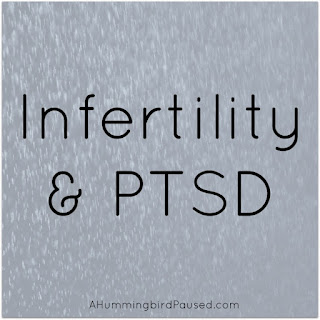Infertility is traumatic. Fearing the loss of a dream or a perceived future, undergoing medical tests and treatments, or losing a pregnancy can all be devastating and traumatic events. It can be extremely difficult to move past feelings of hopelessness or sadness that so often accompany a failed cycle or a miscarriage. We all respond differently to loss or trauma, and some are able to recover very quickly, while others need more time to deal with complicated grief or depression.
I’ve been going to counseling for the past couple of months
for anxiety and depression related to infertility and my miscarriage earlier
this year. My therapist mentioned that
my symptoms are very similar to those of Post-Traumatic Stress Disorder (PTSD).
It surprised me, but then again it didn’t. I mean, infertility is awful and
life changing. Of course it has impacted my life and changed the way I react to
certain situations. I thought I was just depressed, but it’s actually more
complicated than that. It got me thinking, why don’t we talk more about infertility
and PTSD?
Most of the women I’ve met who are suffering from
infertility or pregnancy loss exhibit some of the symptoms of post-traumatic stress, however
very few are seeking treatment. Symptoms
include:
Avoidance Behaviors
Trying to avoid thinking or talking about the trauma
Avoiding places, people, or activities that remind you of
the trauma
Intrusive Memories
Recurrent or unwanted distressing memories of the traumatic
event
Upsetting dreams about the trauma
Hyperarousal, or severe emotional distress or physical reactions to anything
that remind you of the trauma
Negative Changes in
Mood
Depression or anxiety
Feeling emotionally numb
Lack of interest in activities you once enjoyed
Hopelessness about the future
Changes in Emotional
Reactions
Overwhelming guilt or shame
Trouble sleeping
Increases in drinking or use of substances
Irritability or angry outbursts
If you are suffering from any of these symptoms, please seek
help. Infertility is difficult enough as
it is, but suffering from moderate to severe depression or post-traumatic stress are reason to
pursue treatment for your mental health. We get so focused on what’s going on
inside our bodies, that sometimes we forget to care for our emotional and
mental well-being.
If you can’t afford counseling, reach out to others who
understand what you’re going through.
Join a support group, and practice self-care every day. Check with your
employer’s benefits department to see if they offer an Employee Assistance
Program (EAP), which often offers free counseling sessions.
You are definitely not alone in feeling this way, and there
is a light at the end of the tunnel.
For more information:
Mayo Clinic “Post Traumatic Stress Disorder: Symptoms” http://www.mayoclinic.org/diseases-conditions/post-traumatic-stress-disorder/basics/symptoms/con-20022540
Medscape “Examining PTSD as a Complication of Infertility” http://www.medscape.com/viewarticle/719243
ReachOut "Post traumatic stress disorder symptoms, treatment and coping strategies"
https://www.reachout.life/ptsd-symptoms-treatment-and-coping-strategies/
ReachOut "Post traumatic stress disorder symptoms, treatment and coping strategies"
https://www.reachout.life/ptsd-symptoms-treatment-and-coping-strategies/


No comments:
Post a Comment